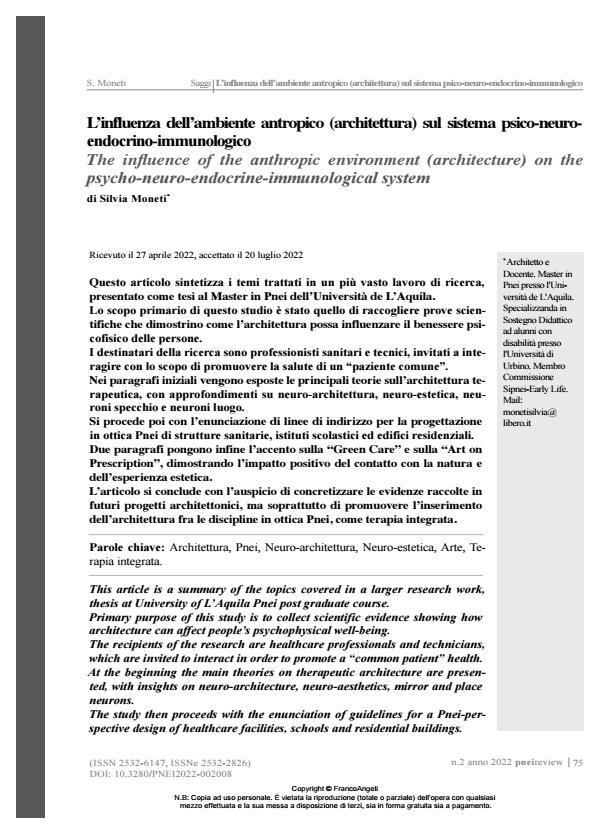L’influenza dell’ambiente antropico (architettura) sul sistema psico-neuroendocrino-immunologico
Titolo Rivista PNEI REVIEW
Autori/Curatori Silvia Moneti
Anno di pubblicazione 2022 Fascicolo 2022/2
Lingua Italiano Numero pagine 17 P. 75-91 Dimensione file 135 KB
DOI 10.3280/PNEI2022-002008
Il DOI è il codice a barre della proprietà intellettuale: per saperne di più
clicca qui
Qui sotto puoi vedere in anteprima la prima pagina di questo articolo.
Se questo articolo ti interessa, lo puoi acquistare (e scaricare in formato pdf) seguendo le facili indicazioni per acquistare il download credit. Acquista Download Credits per scaricare questo Articolo in formato PDF

FrancoAngeli è membro della Publishers International Linking Association, Inc (PILA), associazione indipendente e non profit per facilitare (attraverso i servizi tecnologici implementati da CrossRef.org) l’accesso degli studiosi ai contenuti digitali nelle pubblicazioni professionali e scientifiche.
Questo articolo sintetizza i temi trattati in un più vasto lavoro di ricerca, presentato come tesi al Master in Pnei dell’Università de L’Aquila. Lo scopo primario di questo studio è stato quello di raccogliere prove scientifiche che dimostrino come l’architettura possa influenzare il benessere psi- cofisico delle persone. I destinatari della ricerca sono professionisti sanitari e tecnici, invitati a interagire con lo scopo di promuovere la salute di un "paziente comune". Nei paragrafi iniziali vengono esposte le principali teorie sull’architettura terapeutica, con approfondimenti su neuro-architettura, neuro-estetica, neu roni specchio e neuroni luogo. Si procede poi con l’enunciazione di linee di indirizzo per la progettazione in ottica Pnei di strutture sanitarie, istituti scolastici ed edifici residenziali. Due paragrafi pongono infine l’accento sulla "Green Care" e sulla "Art on Prescription", dimostrando l’impatto positivo del contatto con la natura e dell’esperienza estetica. L’articolo si conclude con l’auspicio di concretizzare le evidenze raccolte in futuri progetti architettonici, ma soprattutto di promuovere l’inserimento dell’architettura fra le discipline in ottica Pnei, come terapia integrata.
Parole chiave:Architettura, Pnei, Neuro-architettura, Neuro-estetica, Arte, Terapia integrata.
Silvia Moneti, L’influenza dell’ambiente antropico (architettura) sul sistema psico-neuroendocrino-immunologico in "PNEI REVIEW" 2/2022, pp 75-91, DOI: 10.3280/PNEI2022-002008